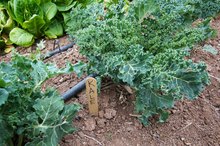How to Dry Home Grown Guava Leaves for Tea
Guava trees, Psidium guajava Linnaeus, grow throughout Brazil and Mexico. Although they are known in the U.S. primarily for their fruit, guava leaves have a history of use by indigenous people for traditional medicines. Guava leaves are a rich source of antioxidants. Antioxidants protect your cells by scavenging free radicals, substances that can damage them. As with any herb, consult your doctor before using guava leaf tea.
Guava Leaf Tea Uses
Brazilian researchers tested an extract from guava leaves and concluded that it's active against Staphylococcus aureus and Salmonella.They published their findings in the January/February 2008 issue of the "Journal of the Institute of Tropical Medicine of São Paulo." Brazilians who don't have access or funds for antibiotics use guava leaf tea for gastroenteritis and child diarrhea. Consult your doctor about any medical concerns and before taking guava leaf tea or any other herb.
Harvesting Home-Grown Guava Leaves
How to Dry Papaya Leaves for Tea
Learn More
Guava leaves gathered in May or August may have higher free radical scavenging activity than leaves gathered in October and December, according to T. K. Lim, author of Edible Medicinal And Non Medicinal Plants, although further research is needed 2. To reduce drying time, cut young, unblemished guava leaves in the afternoon on a warm day. The plants have the most moisture in their leaves in the morning.
Drying Guava Leaves
For drying small batches of guava leaves, tie several leaf stems together with twine and put them in a paper sack with the ends of the stems extending from the bag's opening. Close the bag around the guava leaves by tying twine around the bag on the stems, or with a rubber band. Use a hooks or hangers with clothespins to hang the guava leaves in a warm, dark, dry place such as a closet or attic. Dry large batches of guava leaves flat on window screens. Placing small wooden blocks between the trays makes them stackable to save space. Drying will take three to four weeks, depending on the humidity. Dry them fully, until they feel dry to the touch.
- For drying small batches of guava leaves, tie several leaf stems together with twine and put them in a paper sack with the ends of the stems extending from the bag's opening.
- Close the bag around the guava leaves by tying twine around the bag on the stems, or with a rubber band.
Guava Leaf Tea Considerations
What Are the Benefits of Mullein Leaf?
Learn More
It has a cardiac depressant effect, according to Raintree Nutrition's Tropical Plant Database 3. If you have a heart condition or take any heart medication, talk to your doctor about guava leaf tea before trying it. If you're hypoglycemic, don't use guava leaf tea because it lowers blood sugar. Always talk to your doctor about any medical concerns. Attempting to self-diagnose or self-treat health problems can have serious consequences. Although preliminary studies suggest guava leaves may be useful for certain conditions, further research is needed.
- It has a cardiac depressant effect, according to Raintree Nutrition's Tropical Plant Database 3.
- If you have a heart condition or take any heart medication, talk to your doctor about guava leaf tea before trying it.
Related Articles
References
- Journal of the Institute of Tropical Medicine of São Paulo: Antibacterial Activity of Guava, Psidium Guajava Linnaeus, Leaf Extracts on Diarrhea-causing Enteric Bacteria
- Edible Medicinal And Non Medicinal Plants: Volume 3: Fruits, Volume 3; T. K. Lim
- Raintree Nutrition Tropical Plant Database: Guava
- Guavas, common, raw. FoodData Central. U.S. Department of Agriculture. Published April 1, 2019.
- Chen Y-Y, Wu P-C, Weng S-F, Liu J-F. Glycemia and peak incremental indices of six popular fruits in Taiwan: Healthy and type 2 diabetes subjects compared. J Clin Biochem Nutrition. 2011;49(3):195–199. doi:10.3164/jcbn.11-11
- Antioxidants: In Depth. National Center for Complementary and Integrative Health. Updated September 24, 2017
- Pullar JM, Carr AC, Vissers MCM. The roles of vitamin C in skin health. Nutrients. 2017;9(8):866. doi:10.3390/nu9080866
- Kumari S, Rakavi R, Mangaraj M. Effect of guava in blood glucose and lipid profile in healthy human subjects: A randomized controlled study. J Clin Diagn Res. 2016;10(9):BC04-BC07. doi:10.7860/JCDR/2016/21291.8425
- Aune D, Giovannucci E, Boffetta P, et al. Fruit and vegetable intake and the risk of cardiovascular disease, total cancer and all-cause mortality-a systematic review and dose-response meta-analysis of prospective studies. Int J Epidemiol. 2017;46(3):1029–1056. doi:10.1093/ije/dyw319
- König A, Schwarzinger B, Stadlbauer V, et al. Guava (Psidium guajava) fruit extract prepared by supercritical CO2 extraction inhibits intestinal glucose resorption in a double-blind, randomized clinical study. Nutrients. 2019;11(7):1512. Published 2019 Jul 3. doi:10.3390/nu11071512
- Li Y, Zhang JJ, Xu DP, et al. Bioactivities and health benefits of wild fruits. Int J Mol Sci. 2016;17(8):1258. doi:10.3390/ijms17081258
Writer Bio
Gryphon Adams began publishing in 1985. He contributed to the "San Francisco Chronicle" and "Dark Voices." Adams writes about a variety of topics, including teaching, floral design, landscaping and home furnishings. Adams is a certified health educator and a massage practitioner. He received his Master of Fine Arts at San Francisco State University.









